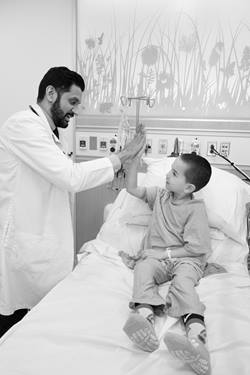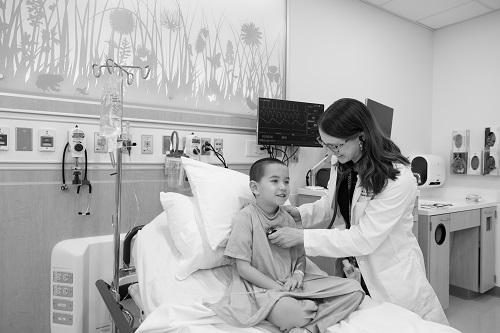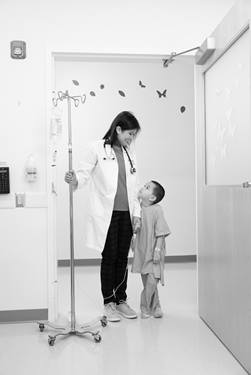Hospital Medicine Fellowship
Hospital Medicine Fellowship
Nationwide Children’s Hospital and the Division of Pediatric Hospital Medicine offers an ACGME accredited two-year Pediatric Hospital Medicine Fellowship.
Nationwide Children’s Hospital’s Pediatric Hospital Medicine Fellowship Program develops academic pediatric hospitalists who are experts in the care of hospitalized newborns, children, and adolescents with acute or chronic illnesses.
Graduates of this program will be leaders in the following areas:
- Innovation, collaboration and provision of high quality and efficient care to hospitalized pediatric patients
- Research and quality improvement
- Education of patients, families, trainees and colleagues
What You Need to Know
Training and Experience
The Pediatric Hospital Medicine Fellowship is committed to an inclusive work environment and the recruitment and retention of physicians from a variety of clinical, educational, and cultural backgrounds.
Quick Facts
- ~ 8,000 yearly admissions and >18,000 total patient days
- 2-year (categorial) or 3-year (research scholar) programs
- IM/Peds track with clinical time at The Ohio State University Wexner Medical Center
- Division and institutional support for research efforts
- Intentional mentorship and wellness initiatives
- Robust educational offerings and opportunities
- Combined ID/PHM fellow, graduation 2028
Hear from Our Faculty
“We all play a part in creating an environment where people feel seen, heard, and valued. In turn, we all reap benefits -- our patients and families receive safe, excellent care, and we collectively evolve into more well-rounded, nimble, and effective physicians. When we adjust the care we provide, health systems, and education to accommodate our patients and families who use languages other than English, all of our patients benefit, and our systems are safer and achieve higher quality outcomes.”
Cara Texler, MD, MPH
Hospital Pediatrics Medical Director of Advocacy
“It has been a wonderful experience working at Nationwide Children's Hospital as a Pediatric Hospitalist. The Pediatric Hospital Medicine fellowship program has a warm and welcoming leadership team and I enjoy interacting with the fellows and fostering a positive learning environment. As a Hispanic woman in the division, I feel valued and appreciated and we are actively seeking to diversify our division on every level. The HP division is a community of people who are there for each other, always offering a helping hand. With many opportunities for personal and professional growth and development, I can’t think of a better place to practice.”
Sofia Davila, MD, FAAP
Section of Pediatric Hospital Medicine
Research Scholar Program (3-year Curriculum)
The Research Scholar Program is a 3-year curriculum intended to train a PHM fellow who can eventually become an independently funded clinician scientist. An ideal candidate would be interested in pursuing scholarly project(s) in clinical or large data-based research. This program includes:
- Grant writing education and experiential learning through NCH intramural grant application
- Works-in-progress meetings and (near) peer cohort with other clinical research fellows and junior faculty
- Mentorship from the Critical Illness Research Affinity Group and Scholarship Oversight Committee in addition to primary research mentor.
- Funding for Master of Public Health (MPH) or (MMSP) during fellowship
Learn more about research at the Abigail Wexner Research Institute
Clinical Curriculum
|
Year One |
Year Two |
|
Hospital Pediatrics (HP) Inpatient Service – 8 weeks
|
Hospital Pediatrics (HP) Inpatient Service – 10 weeks
|
|
Nursery Service – 2 weeks at The Ohio State University |
Pediatric Intensive Care Unit – 2 weeks with option to extend to 4 weeks
|
|
Sedation Rotation – 2 weeks with option to extend to 4 weeks |
Palliative Care – 2 weeks |
|
Community site rotation – 4 weeks |
Infectious Disease Service – 2 weeks with option to extend to 4 weeks |
Individualized Curriculum (2 week blocks)
| Clinical Offerings | Nonclinical Offerings |
|
Hospital Pediatrics Specific*
|
Research, Quality Improvement
|
| Antibiotic Stewardship | Medical Education Innovation |
| Lactation Rotation | Clinical Informatics |
| Emergency Medicine | Clinical Pathways Elective |
| Medical Toxicology |
Longitudinal Leadership Experience |
| Infectious Disease Inpatient* or Consultative Service |
Interprofessional Collaboration Elective |
| PICU* | Scholarly Writing Elective |
| Palliative Care and Hospice* | Simulation Elective |
| Nursery Service* | Remediation in Medical Education Elective |
| Radiology/Interventional Radiology | Educator's Portfolio Elective (1 week) |
| Physical Medical and Rehabilitation Inpatient Service | |
| Pediatric Surgery | |
| Child Abuse | |
| Renal/Endocrine/Genetics Inpatient Service | |
| Psychiatry Inpatient Service | |
| Delivery Room | |
| Global Health Medicine | |
| Adoption Clinic | |
| Dermatology |
*Additional clinical weeks beyond what is required in the core curriculum
Moonlighting
Second year fellows in good standing are eligible to moonlight in urgent cares and community hospital settings.
Internal Medicine/Pediatrics Track – 8-10 total weeks during PHM Fellowship
Track Director: Vignesh Doraiswamy, MD
|
Required Clinical Experiences |
Selective – up to 4 additional weeks per year: |
|
Service at Ohio State University Wexner Medical Center
|
Clinical:
|
| Adult consults at Nationwide Children's Hospital |
Other:
|
| Individual Shifts (7 admitting shifts spread throughout the year occurring during research blocks) or as a consecutive week in place of a selective |
“I think that Nationwide Children's Hospital is one of the best fellowships in the country for Med Peds PHM fellows. We have a large number of Med Peds hospitalists that practice at both Nationwide Children’s and Ohio State University as well as a large Med Peds residency. Because of that existing relationship, I have been able to spend as much elective time as I've wanted on adult hospital medicine services to maintain my adult skills. OSU provides a broad range of experiences for Med Peds PHM fellows. I have been able to rotate at the OSU Ross Heart Hospital on a cardiology-focused hospitalist service, general hospital medicine services and step-down units at OSU Main, hospital medicine service at OSU East (community-based setting), as well as addiction medicine consults. The program leadership has been wonderful in letting me decide how much adult time I want to do each year. If I could do it all over again, I would pick Nationwide Children’s/Ohio State every time for PHM fellowship. The support and appreciation of Med Peds trainees, and the specialty in general, is second to none!”
Kathryn Connor, MD
Scholarly Projects
Fellows are required to engage in scholarly projects during fellowship and produce a written work product to the American Board of Pediatrics at the end of fellowship training. Fellows have project support in the form of a specific research curriculum, project mentorship, scholarly oversight committee and dedicated research months as outlined in the curriculum.
Examples of written work products:
- Peer-reviewed publication

- In-depth manuscript describing the completed project
- Thesis or dissertation written in connection with an advanced degree
- An extramural grant application that has either been accepted or favorably reviewed
- A progress report for projects of exceptional complexity, such as a multi-year clinical trial
Published Fellow Projects
- Advanced Multimodal Communication Curriculum for Pediatric Residents
- Family-centered communication: A pilot educational intervention using deliberate practice and patient feedback
- “Help Me Sleep”: A Quality Initiative to Reduce Overnight Vital Signs
- Neonatal Utilization of Acute Care Services During the COVID-19 Pandemic
- Comparing Outcomes Between Direct and ED Admissions for Neonatal Hyperbilirubinemia
- International Adoption and Factors Affecting Bayley’s Scores
- Evaluation of the Diversity, Equity, and Inclusion Curriculum of a Pediatrics Residency Program
- The Autonomy Toolbox: A Multicenter Collaborative to Promote Resident Autonomy
Research
Research education and training are vital to the mission of Nationwide Children's Hospital and The Abigail Wexner Research Institute at Nationwide Children's Hospital. As a top-ten free-standing pediatric research center and an academic affiliate of The Ohio State University, The Research Institute has an outstanding faculty, dedicated to training and mentoring the next generation of scientists in pediatric research.
Research at Nationwide Children's Hospital
Advocacy
Advocacy training fosters and encourages interest in child advocacy by early involvement and exposure to its many aspects such as addressing social determinants of health, community collaboration, health finance, health policy and legislative advocacy.
Additional Educational Opportunities
Educator’s Essentials
This 6-month program focuses on foundational knowledge of clinical teaching and curriculum design, while cultivating educational leadership and career development. Participants are required to complete an experiential project – curriculum, course evaluation, assessment tool development/validation, etc.
Quality Leadership Academy
QLA prepares future Quality Improvement leaders. During this 6-month course, participants learn how to identify areas for improvement, design interventions to address gaps between current and desired outcomes, collect and analyze performance data, report outcomes, and sustain results. Participants are expected to lead a quality improvement project during this course.
Advanced Degree
Fellows may pursue an advanced degree with approval. Ideally, interest should be identified at the onset of the fellowship. Competitive funding is available through Graduate Medical Education.
Faculty & Fellows
“The individualized curriculum within the Pediatric Hospital Medicine fellowship at Nationwide Children's Hospital allows a fellow to tailor their education and training to prepare for the career they want. For example, leadership is an important aspect of being a pediatric hospitalist, so participating in the longitudinal leadership curriculum helped to further develop my leadership skills, in addition to having the opportunities to learn from leaders within the division and institution.”
Ashleigh Slemmer, MD
“This course (Quality Leadership Academy) was key to building a strong foundation in Quality Improvement tools and methodology. Not only did it give me and my co-fellow a chance to design and implement our own QI project, it also provided key support to help make our project successful.
The Scholarship Oversight Committee (SOC) was great at helping me hone my research skills. It is great to hear feedback from a variety of faculty to help make my academic projects stronger. I received targeted and broad feedback to help me successfully move my projects forward and be a successful academic fellow.”
Karen Allen, MD
“The educator essentials course has been a great way to develop a foundation in curriculum development and medical education scholarship. The face time with leaders in medical education at nationwide is invaluable. I like that the course is complemented not only with the principles in curriculum development and Med Ed scholarship, but also with other aspects of being a leader in academic medicine such as how to effectively facilitate small group sessions, how to build a career in medical education, etc. Overall, it has been a really great experience.
As a Med Peds fellow, the individualized curriculum component of fellowship has been essential. I have been able to rotate on the internal medicine floors at Ohio State and have been able to do as much or as little time as I want there. I love how flexible the scheduling has been with regards to the individualized curriculum; being able to make changes as needed throughout the year has been really helpful. Lastly, program leadership has been very supportive with creating new electives to help meet fellows’ goals for fellowship.”Kathryn Connor, MD
Salary & Benefits
Our Fellows are hospital employees, and as such, they are eligible for the same benefits other full-time staff receive (with the exception of paid time off, which is outlined.)
Application & Selection
The Pediatric Hospital Medicine Fellowship Program at Nationwide Children’s Hospital participates in the Electronic Residency Application Service (ERAS) and the National Residency Match Program (NRMP) within the Medicine and Pediatric Subspecialities Match. Starting in July, applications can be submitted via ERAS. The 3-year Research Scholar Program is listed as a separate program in both ERAS and NRMP. Applicants may apply to both programs.
After applications are received, our fellowship recruitment committee will complete a holistic review of applications and then invite candidates to interview, with interviews taking place from September to early November. Important NRMP dates, including the Rank Order List Certification deadline and Match Day can be found at the NRMP website.

Contact

For more information, please contact:
Monica Chittisivoraphanh
Program Coordinator
nchhpfellowship@NationwideChildrens.org
(614) 722-3019
Nancy N. Liao, MD
Program Director
Nancy.Liao@NationwideChildrens.org
Megan Coe, MD
Associate Program Director
Megan.Coe@NationwideChildrens.org




